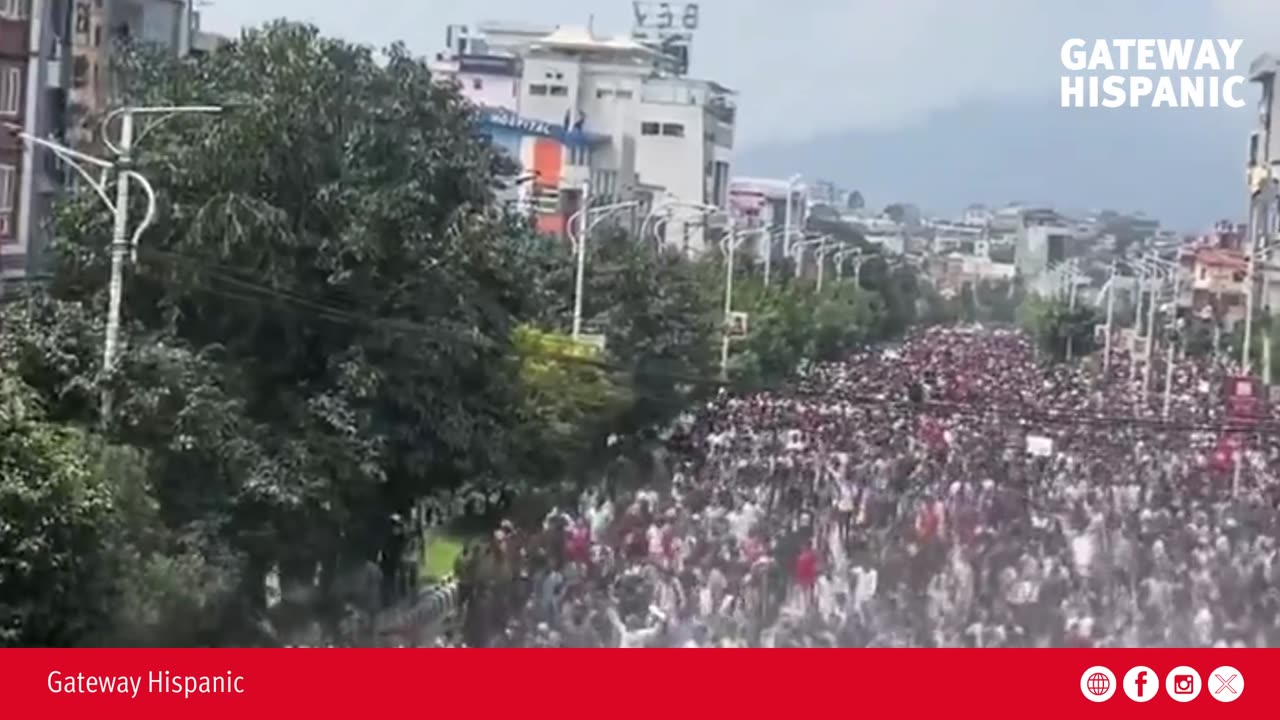Premium Only Content

Historic Crisis in Nepal: Government Overthrown and Violence in the Streets
In a week that will be marked in Nepal’s contemporary history, the Asian nation has witnessed an unprecedented political collapse, characterized by massive protests, street violence, and the overthrow of Prime Minister Khadga Prasad Oli’s government. The unrest, largely led by Generation Z youth, initially emerged as a reaction to the banning of 26 social media platforms in the country. However, it quickly evolved into a nationwide movement demanding an end to corruption, nepotism, and social inequality that have persisted in Nepal for decades.
The protests began with peaceful demonstrations in Kathmandu, the capital, but escalated dramatically when young protesters took to the streets and stormed the Nepali Parliament on September 9. At that time, demonstrators set fire to several government buildings and clashed with security forces, leaving at least 19 dead, including a 12-year-old child, according to official reports. Over the following days, official figures confirmed a total of 51 fatalities: 21 protesters, 9 prisoners, 3 police officers, and 18 unidentified civilians, highlighting the scale of the violence and the gravity of the crisis.
The government and security forces’ response, characterized by the use of lethal force, has sparked intense international debate regarding security management and human rights in Nepal. Experts note that, while violence in the protests cannot be justified, the lack of effective channels for political participation and social media censorship contributed to the escalation of the conflict. In this context, Prime Minister Oli’s resignation and the dissolution of Parliament have left the country in institutional uncertainty, while citizens demand profound change in governance.
The government’s overthrow paved the way for military intervention, with the army taking control of Kathmandu and imposing a temporary curfew to try to contain the unrest. The military also began negotiations with Generation Z leaders and representatives of social movements, aiming to establish an interim government that could guarantee political stability and the continuation of essential services. This critical context led to a historic milestone: on September 12, President Ram Chandra Poudel appointed Sushila Karki, former Chief Justice of the Supreme Court, as Nepal’s first female prime minister. Karki is recognized for her anti-corruption stance and commitment to justice, qualities that have placed her at the center of national and international expectations regarding the country’s political transformation.
Karki’s appointment was not without controversy. Nepal’s constitution prohibits retired judges from assuming executive positions; however, her designation was supported by the military and youth movement leaders seeking to ensure the continuity of reform processes and immediate national stability. This support reflects the perception that Karki’s judicial experience and integrity could provide reliable transitional leadership to guide Nepal through its most turbulent period in decades. International analysts consider this situation evidence of a recurring dilemma in countries with young institutions: the need for leaders with legitimacy and the ability to act effectively in the face of traditional political systems that have failed to meet citizens’ demands.
Beyond politics, Nepal’s crisis reveals profound social unrest, especially among young people. Generation Z has proven to be a decisive actor in transforming contemporary politics, using digital tools to organize, mobilize, and disseminate their message. Far from suppressing the protests, the social media ban acted as a catalyst for accumulated discontent, as digital platforms represented the only space for free expression. This phenomenon reflects how new generations are redefining political activism and civic participation in societies with traditional governance systems.
The human impact of the protests has also been significant. The official figure of 51 dead, including protesters, prisoners, civilians, and police officers, is a painful reminder of the risks societies face when institutional channels for resolving conflicts are insufficient. International human rights organizations have called for violence containment and citizen protection, emphasizing the need to ensure justice for victims and accountability for those responsible for abuses of power. Experts also note that Nepal’s political transition must be accompanied by structural reforms that reduce inequality and promote a more inclusive system, capable of integrating youth into decision-making and building a fairer country.
In this context, Sushila Karki’s arrival represents not only a historic milestone as the first woman to lead the government but also a symbol of hope after decades of governance dominated by political elites and rigid structures. Her role will be key in negotiating with different social sectors and establishing a transitional government capable of preparing fair elections, ensuring citizen security, and rebuilding trust in state institutions. The international community is closely monitoring this process, aware that Nepal faces a critical moment in its democratic history, where decisive action and leadership capacity will be crucial to prevent further violence and ensure a more stable future.
Nepal’s crisis also highlights the importance of digital policy and freedom of expression as engines of social change. The protests sparked by the censorship of online platforms demonstrate how youth can mobilize rapidly against decisions perceived as unjust or arbitrary. This has implications for governments and leaders worldwide: excessive information control policies can backfire, triggering resistance movements and demanding more transparent and participatory responses.
In conclusion, the historic week in Nepal demonstrates that social and political change can arise from youth movements, even against established governments. The combination of digital mobilization, decisive leadership, and legitimate social justice demands has left a profound mark on Nepali politics. As Sushila Karki takes on the challenge of leading the country in a critical moment, international attention focuses on how Nepal can rebuild its institutions, ensure citizen safety, and lay the foundations for a more inclusive and democratic political system.
Nepal’s recent history serves as a reminder of the power of youth and the need for leaders with integrity, prepared to face complex challenges in a context where political and social stability is closely linked to the government’s ability to listen and respond to citizen demands.
-
 4:19
4:19
PistonPop-TV
6 days ago $3.81 earnedThe 4E-FTE: Toyota’s Smallest Turbo Monster
20.2K -
 43:07
43:07
WanderingWithWine
6 days ago $2.24 earned5 Dreamy Italian Houses You Can Own Now! Homes for Sale in Italy
16.5K3 -
 LIVE
LIVE
Spartan
21 hours agoFirst playthrough of First Berserker Khazan
193 watching -
 28:01
28:01
Living Your Wellness Life
2 days agoTrain Your Hormones
18.1K1 -
 43:28
43:28
The Heidi St. John Podcast
1 day agoFan Mail Friday: Faith Over Fear and Finding Strength in Every Season
10.1K -
 1:05:30
1:05:30
SGT Report
1 day agoTHE HORRIBLE TRUTH ABOUT EVERYTHING -- Harley Schlanger
52K94 -
 11:04
11:04
Blackstone Griddles
18 hours agoCountry Fried Steaks on the Blackstone Griddle
94.7K14 -
 49:47
49:47
Brad Owen Poker
1 day agoI Get My First BIIGGG Win! $25,000+ Buy-in! HORSE Championship! Don’t Miss! Poker Vlog Ep 324
18.3K1 -
 9:53
9:53
Rethinking the Dollar
1 day agoWhen Detroit Bleeds, America Suffer! Layoffs Have Begun
21.9K32 -
 18:36
18:36
Clownfish TV
1 day agoYouTube Just NERFED YouTube Gaming... | Clownfish TV
24K32